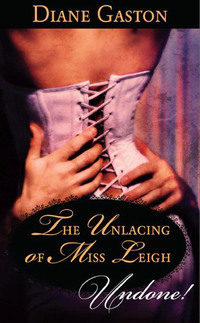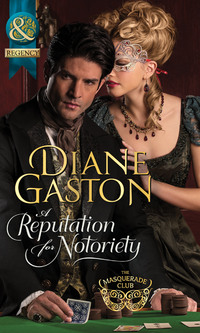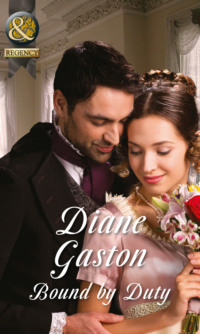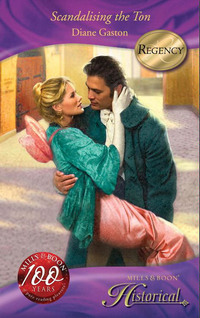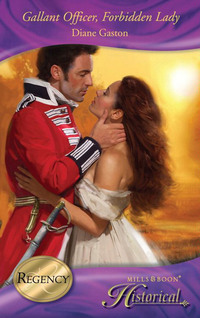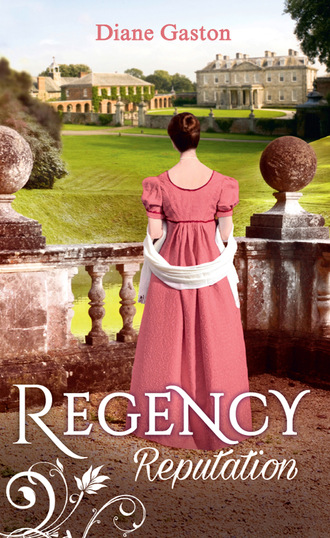
Полная версия
Regency Reputation
He nodded. ‘I had hoped anonymity would be an appeal.’ He took a sip of his wine. ‘And where did you hear this of the place?’
Now it was she who must avoid the truth. To answer truthfully would reveal that she moved in society’s finest circles and that she could not do.
What could she say that would avoid tipping her hand? ‘At the theatre.’
Yes. That ought to suffice. Anyone might attend the theatre.
He stared at her for a moment too long for comfort.
Finally he tasted the food on his plate. ‘And what do you think of my establishment now you have seen it?’
She relaxed a little. Perhaps he was being honest with her. It made sense that a proprietor would want to know if his place appealed or not.
‘It meets my needs very well.’
He glanced up. ‘And your needs are?’
She swallowed a piece of cheese. ‘A place to play cards where a woman might feel secure.’
‘Secure.’ He held her gaze.
She struggled to explain. ‘To feel safe from … the stories one hears about gaming establishments.’
He pinned her with his gaze again. ‘You have felt safe here?’
‘I have,’ she admitted.
What she witnessed from behind her mask was not the worst of what she’d heard of gaming hells, where drinking and debauchery might share the night with charges of cheating and, worst of all, challenges to duels. It almost seemed as civilised as a Mayfair drawing room, except for the wild excitement in the eyes of those on a winning streak and the blanch of despair on the faces of losing players. Those highs and lows were part of gambling. Something she must guard against at all costs.
As well as guarding against this special notice from the proprietor. His watchful dark eyes made her tremble inside.
He turned again to his plate. ‘And what about the gaming here appeals to you? You played whist. Would you also be interested in the hazard table? Faro?’
She shook her head. ‘I do not trust so much in luck.’
Too often in her life luck had totally abandoned her.
His eyes bore into her again. ‘You prefer to rely on skill?’
Her gaze faltered. ‘One must have some control over one’s fate.’
‘I quite agree.’ To her surprise he smiled and his handsome face turned into something wondrous.
She found it momentarily hard to breathe.
His smile turned wry. ‘Although you might say opening a gaming hell cedes too much of one’s fate to luck.’
She forced her voice to work. ‘Chance favours you at the hazard and faro tables, which is why I do not play them. Nor rouge et noir.’
She finished her wine, aware that he continued to stare at her. She fingered her reticule, heavy with counters. ‘May—may I ask the time, please?’
He pulled his watch out again. ‘Three-twenty.’
She stood. ‘I must go. My carriage arrives at three-thirty and I need time to cash out.’
He also rose and walked with her to the ground floor where the cashier sat in a room behind the hall. She felt a thrill watching the coins she’d won stack up in front of her. After scooping them into a leather pouch and placing it in her reticule, she collected her shawl from the dour-faced servant attending the hall.
And Rhysdale remained with her.
He walked her to the door and opened it. ‘I trust you will return to us?’
She suddenly was very eager to return. So eager a part of her wanted to re-enter the game room and deal another hand of whist.
She curbed her excitement. ‘Perhaps.’ Curtsying, she said, ‘Thank you for your assistance, Mr Rhysdale. And for the refreshment.’
‘You are very welcome.’ His voice turned low and seemed to resonate inside her.
She crossed the threshold, relieved to take her leave of him, but he walked out into the dark night with her.
The rush lamp at the door must have revealed her surprise.
‘I will see you into your carriage,’ he explained.
Her coachman drove up immediately and she was grateful her carriage no longer had a crest on its side.
Rhysdale opened the coach door and pulled down the steps. He held out his hand to assist her. His touch was firm and set her nerves trembling anew.
He closed the door and leaned into the window. ‘Goodnight, madam. It has been my pleasure to assist you.’
His pleasure? She took a breath.
‘Goodnight,’ she managed.
The coach pulled away, and she swivelled around to look out the back window.
He stood in the road, illuminated by the rush light.
Still watching her.
Rhys did not leave the road until her carriage disappeared into the darkness.
Who the devil was she?
He did not need to be captivated by a woman. A woman could become an inconvenient distraction and he needed to keep his wits about him. The gaming house must be his priority.
Rhys had known too many women who made their living by acting pleasing at first, then cutting the man’s purse and dashing away. He expected that sort of woman to show up at the gaming hell—women who played at gambling, but who really merely wished to attach themselves to the evening’s big winners.
This woman was not a cutpurse, however. Neither did she come to the gaming hell on a lark.
She came to win money.
He’d watched her play, had seen the concentration in her posture, the calculation in her selection of cards. She was here for the card play.
She was a kindred spirit, a gambler like himself.
Would she return? She must. He wanted her in every way a man wanted a woman.
He walked back into the house, nodding to Cummings as he passed him. When he reached the door to the game room, Xavier appeared, leaning against the wall in the hallway, his arms crossed over his chest.
‘What was that all about?’ his friend asked.
Rhys did not know how much he wished to say about the woman, even to Xavier. ‘She intrigues me.’ He gave his friend a warning look. ‘If she returns, do not aspire to make her one of your conquests.’
Xavier, who attracted female company so easily he never needed to make a conquest, replied, ‘I comprehend.’
They walked into the game room together.
‘Do you know who she is?’ Xavier asked.
Rhys grinned. ‘Not yet.’
Chapter Three
Celia sat at the desk in her library in the rooms she’d taken for the Season, rooms she now had more hope she could afford. Her winnings were stacked in piles on the desk, one half set aside to stake her next venture to the Masquerade Club.
What would she have done had she not discovered the new gaming house? Her widow’s portion had been stretched to the breaking point and the bills continued to pour in.
Now she could transfer some of the bills from one stack to another—ones to pay now, ones to pay later.
She rolled some of the coins in her hand, almost giddy at their cool texture and the clink of them rubbing against each other.
She stacked them again and leaned back, appalled at herself. To be giddy at winning was to travel a perilous path. She must never succumb to the mania that was gambling. Not like her father—and, by association, her mother. They both died of it.
If she played with her head and not her emotions, she should be able to resist. She planned to visit the place often enough to learn who the high-stakes players were. Think of the money she could win in games with such gamblers!
Stop! she warned herself. No emotions. Playing cards must merely be what she did to earn money, like any tradesman or skilled workman.
Celia turned her face to the window and gazed out into the small garden at the back of the house. At the moment she must depend on Rhysdale to find her partners, but soon she would become known to the regulars. Then she hoped to be sought after as a partner.
At least Rhysdale had set her up with partners skilled enough to bring her a tidy profit.
She riffled the stack of coins. She needed more. Her stepdaughter’s Season cost money and her mother-in-law refused to stop spending recklessly.
Her late husband had been another whose gambling and debauchery ruled his life. Her husband had been excessive in everything. Gambling. Spending. Drinking. Mistresses.
He’d even been excessive in his disdain for his young wife.
Not that it mattered now. His death had freed her from a marriage she’d never wanted and from a husband she’d abhorred. It had left her with a stepdaughter nearly her own age and a mother-in-law who despised her.
‘Celia!’ Adele, her stepdaughter, called.
Celia’s singular joy, the closest Celia would ever come to a daughter of her own. Adele. Bright and starry-eyed, and full of hope that her first Season in London would bring her the love match she pined for. Celia was determined Adele should achieve her dreams, dreams that might have been Celia’s own.
If gambling had not robbed her of them.
‘I’m in here, Adele,’ she responded.
Dreams aside, it was pragmatic for Adele to make a good match. The girl deserved to be settled and happy with a husband wealthy and generous enough to support Adele’s grandmother, as well. Celia’s modest widow’s portion might be enough for her to live in some measure of comfort if she economised very carefully, but it definitely did not stretch so far as to support her stepdaughter and mother-in-law.
Besides, Celia had no wish to be shackled to her mother-in-law forever.
Adele bounced into the room and gave Celia a buss on the cheek. ‘Grandmama and I went shopping. We went to the new Burlington Arcade. It was a positive delight!’
‘Was it?’ Celia would miss Adele. The girl was the delight of her life.
Adele danced in front of her. ‘There must have been a hundred shops. We did not see half of them.’ She sobered. ‘But, I assure you, I did not purchase a thing.’
Celia smiled. ‘I hope you enjoyed yourself, none the less.’
‘I did. I cannot tell you of all the items I saw for sale.’ Adele lowered herself onto a nearby chair. ‘Do not tell me those are bills.’
‘They are bills, but do not fret. I have funds to pay some of them.’ Celia moved the stacks of bills to pay farther away from those that would have to wait. ‘Including the modiste. So you may order a new gown or two.’
Adele shook her head. ‘I do not need them. I can make do with my old ones.’
Celia rose from her chair and went over to the girl. ‘Indeed you may not!’ She took Adele’s hands. ‘It is very important for you to put in a good appearance! Your grandmother and I agree on that score. Besides I’ve—I’ve found some funds I did not know we had. We are not so poverty-stricken after all.’
Adele looked sceptical. ‘I hope you are telling me the truth and not shielding me as if I were a child.’
Celia squeezed her hands and avoided the issue. ‘Of course you are not a child. A child does not have a Season.’ Adele was nineteen years old. Celia herself was only twenty-three, but she felt ancient in comparison.
‘I am sending Tucker out with the payments today.’ Tucker had been one of the footmen who had served the Gales for years. Without overstepping the boundaries between servant and master, he’d been loyal to Celia through her marriage and widowhood. He was now her faithful butler.
‘Where did you find the money?’ Adele asked.
Celia pointed to the coins. ‘The silliest thing. I was looking for something else and I discovered a purse full of coin. Your father must have packed it away and forgotten about it.’
Adele’s expression saddened. ‘That was a fortunate thing. Had he found it he would have lost it gambling.’
What would Adele think if she knew where the money had really come from?
Only three people knew of Celia’s trip to the Masquerade Club—Tucker, her housekeeper, Mrs Bell, and Younie, Celia’s lady’s maid. Younie was lady’s maid to all three women since Lord Gale’s death.
What would Adele think if she knew Celia planned to return to the gaming hell tonight?
An image of Rhysdale flew into her mind. Would he watch her again? Her heartbeat accelerated.
The Dowager Lady Gale, Celia’s mother-in-law, entered the room. ‘There you are, Adele.’ She did not greet Celia. ‘We must decide what you are to wear to the musicale tonight. It cannot be the blue gown again. Everyone has seen that gown twice already. It will be remembered.’ She finally turned to Celia. ‘She absolutely needs new dresses. You are excessively cruel to deny them to her.’
Celia pasted a smile on her face. ‘Good afternoon, Lady Gale.’
Like Celia, Lady Gale wanted Adele to have a successful Season, ending in a betrothal. The difference was, Celia wanted Adele to find someone who could make her happy; Lady Gale cared only that Adele marry a man with a good title and good fortune.
Celia adopted a mollifying tone. ‘You will be pleased to know Adele and I have been talking of dresses. I have payment for the modiste, so Adele may order two new gowns.’
Her mother-in-law, silver-haired and as slim-figured as she’d been in her own Season, narrowed her eyes. ‘Only two? I cannot abide how tight-fisted you are!’
Celia forced herself to hold her tongue. Engaging in a shouting match with the dowager would serve no purpose. ‘Only two for now, but I am confident our finances will soon improve and Adele may order more.’
Her conscience niggled. How many times had her father purchased something, saying he’d win enough to pay for it?
Lady Gale pursed her thin lips. ‘And I am to wear my old rags, I suppose.’
Celia’s smile froze. ‘You may order two gowns for yourself, if you like.’
‘Will you come with us tonight, Celia?’ Adele looked hopeful. She was too kind to say she did not find her grandmother’s company altogether pleasant at such gatherings.
Celia calculated what time the musicale would end. It would still give her time to attend the gaming house for a few hours of play. ‘If you wish.’
‘I do!’ Adele’s countenance brightened.
Her grandmother rolled her eyes. ‘You will dress properly, I hope.’
‘I will, indeed.’ Celia always dressed properly. Her most daring gown was the one she’d worn to the Masquerade Club the night before. Its neckline had always seemed too low. She’d only worn it because she thought no one would recognise her in it, as if anyone at these society events noticed what she wore. None the less, she would change into it to wear to the gaming house tonight, as well.
She turned to Adele. ‘Why don’t you see if Younie has any ideas of how to alter one of your old gowns for tonight? She is very clever at that sort of thing.’
Adele jumped to her feet. ‘An excellent idea! I will do that right away.’ She started for the door. ‘I beg your leave, Grandmama.’
Lady Gale waved her away. ‘Go.’ She called after Adele. ‘Younie is in my room, Adele. She is mending.’
Adele skipped away and Lady Gale turned to Celia. ‘I do not see why my granddaughter and I must share your lady’s maid.’
Celia kept her voice even. ‘Because we do not have the funds to hire more servants.’
‘Money!’ the older woman huffed. ‘That is all you ever talk of.’
Money had consumed her thoughts, Celia would be the first to admit. Except this day thoughts of money were mixed with combinations of hearts, spades, clubs and diamonds.
Would Rhysdale be pleased at her return? Celia wondered.
She gave herself a good shake. Why was she even thinking of the man? It was not a good thing that she had come to his notice, no matter how attractively masculine he was. She planned to win and win often.
What if he accused her of cheating?
Lady Devine’s musicale was a sought-after event and Celia’s mother-in-law said more than once how lucky they were to have received an invitation. Celia, Adele and Lady Gale were announced amidst Lady Gale’s grumbling that they ought to have had a gentleman escorting them.
They strolled through the rooms where the pink of the ton were assembled. Celia recognised some of the men as having been at the gaming house the previous night and she wondered how many more of these people—ladies especially—had been there, as well, but wearing masks as she had done.
Some of the gentlemen’s faces at this entertainment had been quite animated at the gaming house, impassioned by the cards or the dice. Here in this Mayfair town house their expressions were bland. It seemed as if the risks of winning or losing made them come alive.
She did not know their names. The ton were known to her only from newspaper articles or books on the peerage. When her parents had been alive she’d been too young for London society. By the time she was married, her husband chose to keep her in the country so as not to interfere with his other ‘interests.’ The arrangement had suited her well enough. She preferred him to be away.
If she had been with him in London, though, she might have had some warning of his profligacy and the condition of his finances. She would have seen in him the telltale signs of gambling lust. Her childhood had honed her for it.
Her mother-in-law ought to have known how debauched her son had become. Lady Gale had spent most of her time in London as part of the social scene. In fact, it was because of Celia’s mother-in-law that they received as many invitations as they did. But her mother-in-law would never countenance anything negative being said about her only son.
Except his choice of a second wife.
One of the men who had been at the gaming hell passed close by. Celia had an impulse to ask her mother-in-law who the gentleman was, but Lady Gale gestured to her dismissively before she could speak.
‘Get me a glass of wine,’ the older woman ordered. ‘It is so tedious not to have a man about to perform such niceties.’
‘I will get it for you, Grandmama,’ Adele said. ‘Do not trouble Celia.’
Before either lady could protest, Adele disappeared through the crowd.
Lady Gale pursed her lips at Celia, but something quickly caught her eye. ‘Look. There is our cousin Luther.’
Luther was second cousin to Celia’s husband. And he was the new Baron Gale.
Needless to say, Luther was none too pleased at the state of his inheritance, mortgaged to the hilt, all reserves depleted. He had not the least inclination to offer any financial assistance to the former baron’s mother, daughter or wife, as a result.
‘Yoo-hoo! Luther!’ Lady Gale waved.
The man tried to ignore her but, with a resigned look upon his face, walked over to where they stood. ‘Good evening, ladies.’ He bowed. ‘I trust you are well.’
‘We are exceeding well,’ Lady Gale chirped, suddenly as bright and cheerful as she’d previously been sullen. ‘And you, sir?’
‘Tolerable,’ he muttered, his eyes straying to elsewhere in the room.
‘My granddaughter is here, Luther, dear,’ she went on. ‘You will want to greet her, I am sure.’
Luther looked as if he’d desire anything but.
‘It is her Season, do you recall?’ Lady Gale fluttered her lashes as if she were the girl having her Season. ‘We expect many suitors.’
‘Do you?’ Luther appeared to search for a means of escape.
‘Her dowry is respectable, you know.’ That was because her father, Celia’s husband, had been unable to get his hands on it.
Luther’s brows rose in interest. ‘Is that so?’
Celia felt a sudden dread. Surely Lady Gale would not try to make a match between Adele and Luther? Luther had already proved to be excessively unkind. After all, he’d taken over Gale House as soon as Celia’s year of mourning was completed, removing Celia, Adele and Lady Gale without an offer of another residence. Even now he was rattling around in the London town house by himself when he could very easily have hosted the three women for the Season. That simple act would have saved Celia plenty of money and would have given Adele more prestige.
‘Gale!’ some gentleman called. ‘Are you coming?’
Luther did not hesitate. ‘If you will pardon me.’ He bowed again.
‘But,’ Lady Gale spoke to his retreating back, ‘you have not yet greeted Adele!’
‘He can see Adele another time,’ Celia assured her. ‘In fact, he could call upon us, which would be the civil thing for him to do.’
Lady Gale flicked her away as if she were an annoying fly. ‘He is much too busy. He is a peer now, you know.’
A peer who cared nothing for his relations.
Adele returned, carrying two glasses of wine. ‘I brought one for you, too, Celia.’ She handed a glass to her grandmother and one to Celia.
Adele was always so considerate. Sometimes Celia wondered how the girl could share the same blood as her father and grandmother.
Lady Gale snapped, ‘Adele, you missed our cousin, Luther. He was here but a moment ago.’ She made it sound as if Adele should have known to come back earlier.
‘Oh?’ Adele responded brightly. Did Adele simply ignore her grandmother’s chiding or did she not hear it? ‘I have wanted to meet him and ask how all the people are at Gale House. I do miss them!’
One of Lady Gale’s friends found her and the two women were quickly engaged in a lively conversation.
Adele leaned close to Celia. ‘The kindest gentleman assisted me. I—I do not know if I properly thanked him. I must do so if I see him again.’
Celia smiled at her. ‘You will be meeting many gentlemen this Season.’ She so wanted Adele to pick a steady, responsible, generous man.
Luther was certainly not generous.
‘You grandmother will wish to select your suitors, you know,’ Celia added.
Adele frowned. ‘I do want her to be pleased with me.’
Celia sipped her wine. ‘You must please yourself first of all.’
Adele would not be pushed into a marriage she did not want and should not have to endure—as Celia had been. Celia would make certain of it.
The start of the programme was announced and Lady Gale gestured impatiently for Celia and Adele to follow her while she continued in deep conversation with her friend. They took their chairs and soon the music began.
Lady Devine had hired musicians and singers to perform the one-act French opera, Le Calife de Bagdad by Boieldieu. The comic opera was ideal for an audience who were intent on marriage matches. In the opera, the mother of the ingenue Zétulbé, refuses to allow the girl to marry the Caliph of Baghdad, who meets her disguised as an ordinary man. When he tries to impress the family with extravagant gifts, the mother merely thinks he is a brigand.
It should be every family’s fear—that the man marrying their daughter is not what he seems. It certainly was Celia’s fear for Adele. If only Celia’s experience had been more like Zétulbé’s, discovering the generous and loving prince disguised as something less. Celia’s husband had been the opposite. Presented by her guardians as a fine, upstanding man, but truly a cruel and thoughtless one in disguise.
As the music enveloped Celia she wondered if all men hid their true colours.
Of course, she disguised herself, too. She pretended to be a respectable lady, but she visited a gaming hell at night. Once there, she disguised herself again by wearing a mask and pretending to be a gambler, when gambling and gamblers were what she detested most in the world.
The tenor playing the Caliph’s part stepped forwards to sing of his love for Zétulbé. Celia closed her eyes and tried to merely enjoy the music. An image of Rhysdale flashed through her mind. Like the tenor’s, Rhysdale’s voice had teemed with seduction.
Rhys watched the door from the moment he opened the gambling house. He watched for her—the woman in the black-and-gold mask.
‘Who are you expecting?’ Xavier asked him. ‘Someone to make our fortunes or to take it all away?’
He shrugged. ‘The woman I told you about last night.’
Xavier’s brow furrowed. ‘This is not the time for a conquest, Rhys. Your future depends upon making this place a success.’
Xavier was not saying anything Rhys had not said multiple times to himself. Still, he flushed with anger. ‘I will not neglect my responsibilities.’




